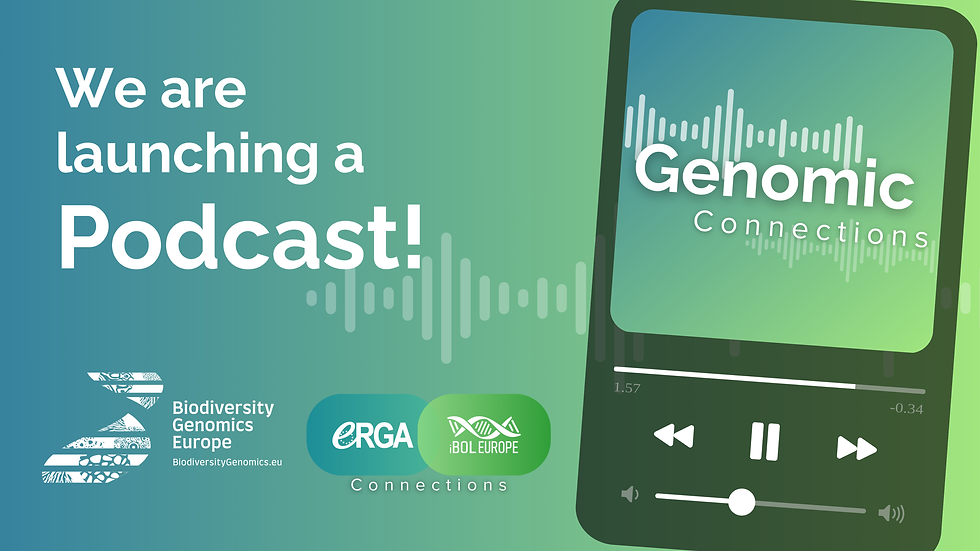5 Questions to Alice Mouton, chair of the Training & Knowledge Transfer Committee
- luisamarins19
- May 8, 2024
- 4 min read
Updated: May 10, 2024
Read the full interview with Alice Mouton below:
1. Can you introduce yourself and how you got involved with ERGA and the Training and Knowledge Transfer Committee?
My name is Alice Mouton and I’m a researcher based in Belgium. I got actively involved in the early stages of building the European Reference Genome Atlas (ERGA). Early on, I was actually engaging with the Belgian representative of the Cluster 6 of the Horizon Europe Work Program to make some modifications on the draft of the call for the future Horizon Europe project that would better fit ERGA and is now currently underway (BGE). I got naturally involved as well in the early stages of ERGA by being elected as one of the Belgian representatives in the ERGA Council.
Back in 2021 I was mostly involved with the SSP (Sampling & Sample Processing) Committee and I started to supervise and coordinate the ERGA Pilot project with Ann Mc Cartney and Giulio Formenti. Because I was starting to have a heavy workload with the ERGA Pilot project on a voluntary basis while working on my postdoc project, I had to slow down my different activities in the other committees. I actually got involved in the TKT committee more recently around 2022. I helped with the submission and the organization of the EMBO course that was held in Belgium by another TKT member. That's how I put my foot into the TKT committee. I got hired through the Biodiversity Genomics Europe projects as a training and knowledge transfer officer. It was quite evident that I would lead the TKT committee due to my position.
2. What are the main activities of the ERGA Training & Knowledge Transfer Committee?
Our committee has several types of actions. We support the design and the implementation of learning and skill sharing activities. We also have the goal of collecting, promoting and developing training materials in biodiversity genomics - like webinars, workshops and other activities. We also receive more direct support requests from members who want to organize a workshop. We offer help promoting and organizing these community workshop. We have the goal of connecting and supporting members to develop proposals for financing activity related to Training and Knowledge Transfer.
We have gained experience by submitting a few of those applications in the last few years. We are also building a knowledge hub where everyone will be able to find educational/learning materials, such as tutorials related to every step of the genome generation workflow: from genome assembly to how to request a permit and downstream analysis or how to involve stakeholders in the project. Right now, we are working on a guide with some tips and practical advice on how to organize events such as workshops, conferences, webinars, which will be openly available to everyone.
3. What are the most interesting and the most challenging aspects of chairing TKT?
The most interesting part is actually seeing that we can make a difference. When we organize workshops they are free of charge and we have high attendance. So I think it's really exciting because it shows that there is a lot of interest in training activity around biodiversity genomics.
Perhaps one of the challenges within ERGA is to make connections with the other committees. When other committees need help organizing workshops or webinars, TKT is here to offer support but sometimes there is a lack of communication. One of the challenges is making TKT visible to the other committees.
4. In your experience, what do you see as the most effective strategies to promote effective biodiversity genomics training and capacity building across Europe, considering the complexity of the task and great heterogeneity between countries?
It really is a challenging task to promote training in biodiversity genomics across Europe. Mostly because genomic knowledge is not equally distributed across the continent, we have a strong bias: Western European countries generally having more experienced researchers in the field while Eastern European countries tend to have less people with training in genomics. So there is a bias that we should somehow address. There is also a strong financial barrier to access to knowledge and training because of access to funding.
Access to adequate computational infrastructure is another challenge. When we offer free genomics workshops, they are often too short for the participants to fully grasp the complexity of a certain type of genomic analysis. Online workshops also require a stable internet connection and we have high demand and not that many spots can be offered. So I think maybe the most effective strategy to promote biologist genomics training would be first to have an European computer infrastructure that would be available to all researchers in the continent. This would solve a critical issue: when we organize a workshop we offer access to a high performance computer and then when the workshop ends the participant might not have access to this kind of resource. So they might learn how to do the analysis but they don't have access to the resources needed to perform this analysis with their own data. That’s why I think that one of the best strategies to really boost training in genomics in Europe would be to invest in infrastructure development.
Another effective strategy to promote genomics training is to provide all of these tutorials and step by step tutorials free of charge. Currently a lot of knowledge and resources are kept private or within individual research groups.
5. What do you see as the next steps for the ERGA TKT Committee?
I think the most important step right now for the TKT committee is to finalize the ERGA Knowledge Hub. This will be a really important resource for the biodiversity genomics community from Europe and beyond to have easy access to many step by step tutorials and other training materials.



